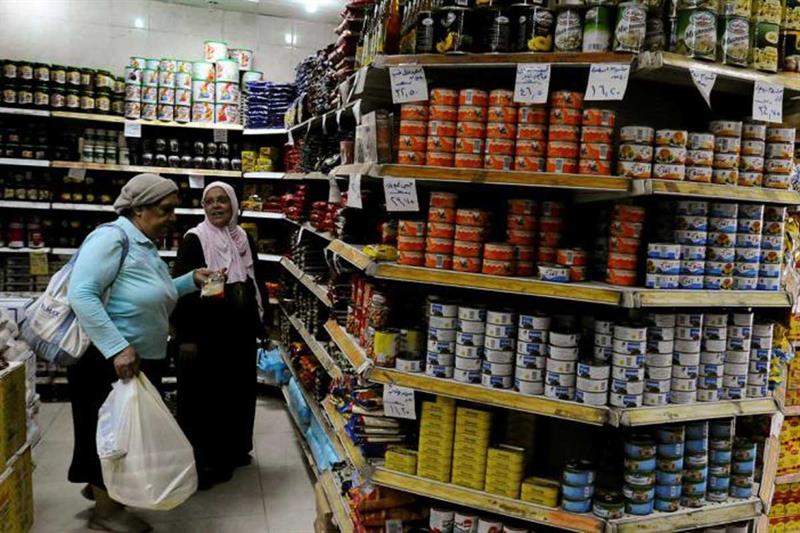
File Photo: Two Egyptian women shopping in a supermarket in Cairo, Egypt (Reuters)
CAPMAS attributed the decline in monthly inflation mainly to the decrease of food and beverage prices by 2.2 percent, while other commodities and services, such as shoes and clothes, healthcare,and transport, recorded a price rise ranging between 0.3 percent and two percent.
Affected by disruption in global supply chains, COVID-19 pandemic, the Russian-Ukrainian conflict, and the devaluation of the Egyptian pound, Egypt’s inflation started to speed up entering the double-digit zone in March.
The annual headline inflation accelerated to 14.7 percent in June, up from 5.3 percent in the correspondent month of 2021.
CAPMAS said the increase in the annual headline inflation was the result of the rise in the prices of food and beverage commodities by 24.2 percent, housing, electricity and oil by 8.7 percent, entertainment by 29.7 percent, and education by 13.9 percent.
Despite the accelerated inflation, the Monetary Policy Committee (MPC) of the Central Bank of Egypt (CBE) maintained the key interest rates in June to record 11.25 percent, 12.25 percent, 11.75 percent, and 11.75, for overnight deposit rate, overnight lending rate, the rate of the main operation, and the discount rate respectively.
Since the onset of the war in Ukraine in March, the CBE hiked the interest rates by a total of 300 basis points (three percent) in response to the global inflationary wave and the impact of the war.
“The MPC treats the developments stemming from the Russo-Ukrainian conflict to be among the exogenous shocks that are outside the scope of monetary policy and yet may lead to transitory deviations from pre-announced target rates. Monetary policy tools are utilised to anchor inflation expectations, contain demand-side pressures and second-round effects emanating from supply shocks that may lead to deviations from inflation targets. Therefore, in accommodation of the first round effects of supply shocks, the elevated annual headline inflation rate will be temporarily tolerated relative to the CBE’s pre-announced target of seven percent (±2 percentage points) on average in 2022 Q4, before declining thereafter,” the CBE stated in June.
The managing director of the International Monetary Fund (IMF) Kristalina Georgieva said on Thursday that the fund is about to lower its expectations for the global economic growth for the second time since the outbreak of the war in Ukraine.
Georgieva explained that the action comes under the pressure of the elevating global inflationary wave.
She stressed that 2022 is a hard year for all economies and 2023 will be tougher as they are expected to experience economic recession.
The US Federal Reserve said that another interest rate hike of 50 or 75 basis points (0.5 percent or 75 percent) is likely to be passed at the July meeting driven by the rising global inflationary pressure.
Short link: